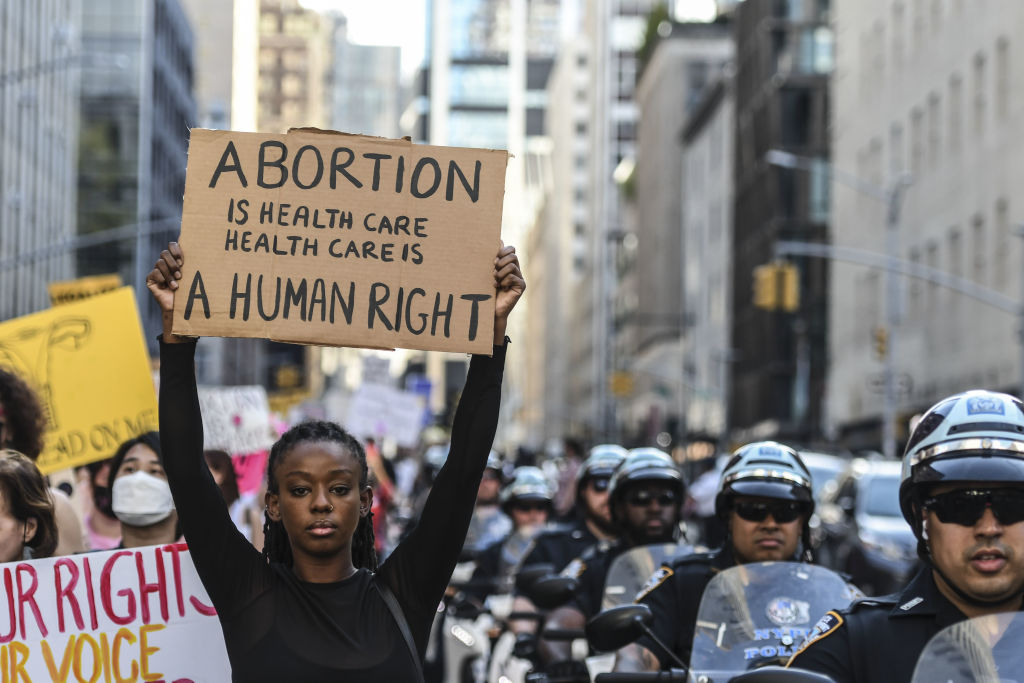Amber Thurman’s Death Caused By Delayed Post-Abortion Care Was ‘Preventable’ Health Experts Say

Source: eggeeggjiew / Getty
Amber Thurman, a 28-year-old Black mom from Georgia died on Aug. 19, 2022 after a rare and severe infection she’d developed went untreated for more than 17 hours by staff, including doctors. Health experts now say her death was ‘preventable.”
On Aug. 13 of 2022 Thurman legally and under medical supervision, sought to terminate a pregnancy with safe and effective abortion pills provided to her by a women’s clinic in North Carolina. The pills rarely cause complications–32 women in 6 million have been documented as experiencing them. Unfortunately, Amber was one of those women.
But most unfortunately, the common and simple procedure that would have resolved the medical crisis she found herself in on Aug. 18, was delayed for nearly a full day after her arrival at Atlanta’s Piedmont Hospital. Barring the choice to delay but multiple hospital staff, Amber would almost certainly be alive, raising her son.
Painfully, no one should be surprised that this avoidable tragedy occurred. As we reported last year, Black women and girls are especially at-risk after the Supreme Court’s June 24, 2022 decision in Dobbs v Jackson Women’s Health which struck down the constitutional right to women’s body sovereignty, including abortion. Medical racism and specifically misogynoir, is a key factor in that finding.
What happened to Amber on the night of August 18, 2022?
According to a Sept. 16 report published by ProPublica, days after Georgia’s abortion ban took effect on July 20, 2022, Amber learned she was pregnant–and that her pregnancy had just passed six weeks. Her access to abortion was blocked. The Dobbs decision that struck down Roe v Wade and left women’s healthcare up to the states, offered her limited options.
Amber, already a mother to a young son who was about to enroll in nursing school, needed to remain focused on her most important and immediate responsibility: ensuring her existing family’s well-being, financially and otherwise.
Given her home state’s new law, Thurman scheduled a dilation and curettage (D&C) in North Carolina, where abortion was still permitted. The medical procedure involves dilating the cervix and using a surgical instrument called a curette to remove tissue from the uterus. It is commonly performed for several reasons, including clearing the uterus after a miscarriage or abortion to eliminate remaining tissue.
On the same day reporting emerged about 28-year-old Amber Thurman dying after not receiving urgent care in Georgia, JD Vance called overturning Roe "a victory" during a speech in *Atlanta.*@jrpsaki: "It sure as hell wasn't a victory for Amber." pic.twitter.com/PL5bt939Mz
— Inside with Jen Psaki (@InsideWithPsaki) September 17, 2024
Thurman developed a serious infection.
Traffic disruptions caused Amber Thurman to be late for her appointment at a clinic, which was overwhelmed by women from states with restrictive abortion and reproductive health laws. Instead, a clinic staff member provided her with legally obtained abortion pills, assuring her that her pregnancy was well within the standard guidelines for the treatment.
Upon returning home to Georgia, Thurman experienced severe complications, including intense pain and heavy bleeding. Although the North Carolina clinic offered a free follow-up D&C, it was too far for her to travel to given the condition she was in. Instead, she sought help at Piedmont Henry Hospital. Medical records indicate that doctors noted a foul odor during a pelvic exam, and an ultrasound revealed possible tissue remaining in her uterus.
Typically, the signs of sepsis would lead to a D&C procedure to remove fetal tissue, especially given Amber Thurman’s vulnerability as a Black woman. Maternal sepsis is a leading cause of maternal mortality in the United States, with Black women twice as likely to face severe cases compared to their white counterparts. However, early-stage sepsis can mimic typical pregnancy symptoms, complicating diagnosis, according to the Associated Press.
The “LIFE Act” prevented Thurman from receiving care.
Sadly, Georgia’s Living Infants and Fairness Equality Act, or “LIFE Act,” made such a procedure a potential felony, causing significant hesitation among the medical staff. As Thurman’s condition deteriorated, the hospital delayed the surgery for nearly a day. Ultimately, after her organs began to fail, she was taken in for surgery, but tragically, she did not survive. Her mother recounted her final words: “Promise me you’ll take care of my son.”
Amber Thurman was 28 years old. She loved being a mom to her six-year-old boy.
Her last words to her own mother: "“Promise me you’ll take care of my son.”
Her son will grow up without his mom because of Donald Trump's Dobbs' decision and Georgia's MAGA abortion ban. pic.twitter.com/TTp2bO7gX1
— Leah Greenberg (@Leahgreenb) September 17, 2024
Health experts who assessed Thurman’s tragic death and determined that it was preventable highlighted that the hospital’s delay in performing the necessary procedure played a significant role in her fatal outcome. Doctors could have utilized a vague exception within the “LIFE Act,” which is meant to protect the mother’s life. However, the Guttmacher Institute points out that most exceptions in such laws are deliberately complex, often containing ambiguous language and imposing onerous requirements that hinder timely care.
Thurman’s death serves as a tragic reminder of the urgent need to protect Black expectant mothers in the U.S., who experience the highest maternal mortality rate in the nation—69.9 deaths per 100,000 live births in 2021, nearly three times that of white women, according to the Centers for Disease Control and Prevention (CDC). It’s clear that we need immediate action to secure reproductive care rights.
SEE MORE:
Black Maternal Health: Former NFL Cheerleader’s Death Spotlights Racial Equity In Sepis Care
Black Women Express Concerns About The Future Of Abortion And Reproductive Rights In New Poll

The post Amber Thurman’s Death Caused By Delayed Post-Abortion Care Was ‘Preventable’ Health Experts Say appeared first on NewsOne.

Post a Comment
0 Comments